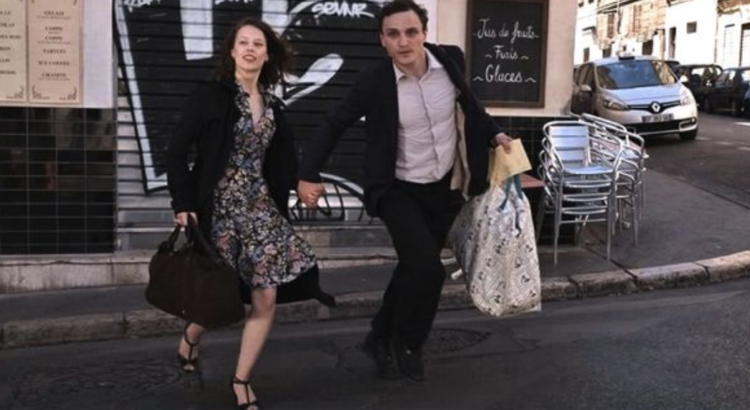As soon as the credits roll I hightailed it out of the viewing room. I can’t stand the cold so I ran all the way home, and the scene was so terrible. There’s the harsh yellow of the streetlights reflecting all along the ice on the road, which is shining wetly like a giant tongue. I look back to check for headlights before I dash across the street to my block, and the wind takes the liberty of yanking through my hair so it flies in my face and mixes with the sickly lights.
So this might be my new favorite movie.
Georg’s expression at the last few frames was terrible. Forget Mona Lisa’s enigmatic smile, this guy creates a symphony with his painfully hopeful eyes and the gentle set of his lips, scarred from a childhood cleft palate surgery, only adding to the confused ambiance he creates. Throughout the film he occupies a character with infinite, though guarded, softness, while maintaining a fairly traditional father-figure posture. He is not completely any one thing, but I recognized a fragility in him I hoped wouldn’t prove to be dangerous for him. 
Marie is by contrast mostly flat, though her wishy-washy approach to everything still makes her a wild card. She is a ghost, pale and able to see through people. She reacts to conversation quietly, choosing subtlety over big outward expression, and in this way, she haunts.
Director Christian Petzold has made me the exact right kind of unsettled with Transit. There is so much casualness in this: a complete disregard for metaphors in the weather, the sun out even in times of keen distress; traumatic events regarded with little ceremony. Strangely it’s the smallest things that are amplified. Right off the sound seems wrong: the tiny tapping of a glass on a table rings out, a door sliding shut is like a jail cell clanging. All throughout I don’t quite understand what I’m feeling, unable to cry though I can sense sadness here.
The way Petzold plays with time works so well with the confusion of identities throughout the movie–cars and clothing and language are modern, but there are typewriters present, and historical architecture. Members of the Navy in Crackerjack-esque uniforms dine with our Georg in the local pizza shop; air travel is not mentioned, only by ship. The sleepy brightness of the seaside seems infinitely ancient in its sun-bleached scenery. Nazis are occupying countries all throughout Europe, but The traveling itself is another element, coming upon a new place full of strangers, trying to reach another, more obscure land across the ocean. It all collects together to blur any useful divide between the real and imagined.
Going back and forth to the hotel room and port and consulate did seem repetitive, without any discernible reasoning. Already there is a considerable amount of confusion present, so the redundancy of the dashings does nothing for the film’s emotional success. It only creates repeating, nearly identical cycles that do not move the plot forward.
Cycles are, however, the most important part of the movie, and may say something about the message Petzold was trying to convey. After Marie disappears back into the city at the end (as she does so well), Georg is left eternally waiting for her in the pizza shop, mournfully gazing out to meet the eyes again of the woman he had immediately fallen in love with. It seems she is free now, like he used to be, and he is stuck wandering looking for his lost love, the very sickness that had plagued her.
It’s interesting to drag a historical event out of its place comfortably in the past and out into the open modern era. It makes us nervous to consider whether political and military atrocities will really stay away from the present, or if we’re still capable of unbelievable things even after we have advanced as a society. Maybe they take different forms, but it is foolish to think we are any less evil than before, and thus we cannot pretend we live safely apart from those terrors.



